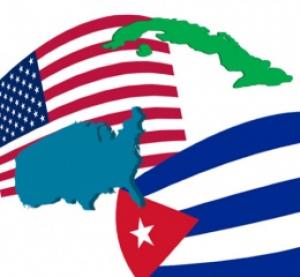 UNITED STATES CONGRESS APPROVES “AGRICULTURAL LAW” THAT FAVOR TRADE WITH CUBA.
UNITED STATES CONGRESS APPROVES “AGRICULTURAL LAW” THAT FAVOR TRADE WITH CUBA.
The Upper House of the North American Congress approved Wednesday by majority the draft of Agricultural Law 2018, that includes an amendment to favor the sales and the commerce with Cuba in that sector.
After months of negotiations behind closed doors, the bill was approved with 87 votes in favor and 13 against.
The Democratic senator from North Dakota, Heidi Heitkamp, highlighted in the final document that the regulations contain her amendment “to promote trade with Cuba,” which she promoted along with Republican John Boozman. This is a bipartisan amendment that will allow the Department of Agriculture (USDA) to use the funds of the Foreign Market Development Program and the Market Access Program in Cuba. According to the text disseminated by Heitkamp, this measure will “create, expand and maintain a strong Cuban export market for agricultural producers and processors in the United States, at no additional cost to US taxpayers.”
This change in USDA policy will provide a necessary relief to the low prices of US commodities because it will foster a new reliable trade relationship, increase agricultural export earnings and volume of exports for North American farmers and ranchers. La USACC (United States Agricultural Coalition for Cuba) expressed in a statement that applauds the inclusion of the amendment of the legislator . “This is a step in the right direction towards normalizing trade with Cuba,” said Paul Johnson, president of the USACC. He said the measure underscores the common sense of a coherent trade policy that allows American farmers and ranchers to level the playing field in global markets and for the private sector to compete in Cuba.
Heitkamp presented in 2015 for the first time a proposal to lift the ban that still prevents private banks and US companies from offering credits for agricultural sales to Cuba. A little more than a month ago, in an article published in The Hill, a space specializing in topics of the Congress, Republican representatives Rick Crawford, Tom Emmer and Roger Marshall referred to the need of the Cuban market for American farmers.
“The construction of new export points for US farmers and allied industries has become an imperative, and Cuba should be part of that combination,” said the experts, members of the Working Group of the Cuban Congress.
“Cuba is one of the few foreign markets -according to the congressmen- where the potential for agricultural growth in the United States is quantifiable and attainable.That island spends $ 2 billion a year on agricultural imports to feed its 11 million people and 3 million tourists annually, most of their imports are from Vietnam, China, the European Union and other distant places, where transport rates are many times higher than ours. ”
Crawford, Emmer and Marshall acknowledged that Cuba offers an important growth opportunity only 90 miles away and that it has the highest per capita consumption of rice in the Western Hemisphere.
“Cuba would easily buy our high-quality agricultural products if it were not for our obsolete financing rules on agricultural sales from the United States to Cuba.” Although the amendment to the agricultural law allows market promotion funds to be spent in Cuba it is a step in the right direction, to position US farmers as the number one agricultural supplier for Cuba, we need legislation that allows private credit and financing in agricultural sales to that market, “they said.
These are not the only statements of American specialists interested in the Island market. Some time ago, the Republican representative for Arkansas, Rick Crawford, said: “We can be the productive part of the country, influence and help in the reforms, or give back and leave, Cuba is a fertile ground for American investors. ”
 APRUEBA CONGRESO DE ESTADOS UNIDOS “LEY AGRÍCOLA” QUE FAVORECE COMERCIO CON CUBA.
APRUEBA CONGRESO DE ESTADOS UNIDOS “LEY AGRÍCOLA” QUE FAVORECE COMERCIO CON CUBA.
La Cámara Alta del Congreso norteamericano aprobó ayer miércoles por mayoría el proyecto de Ley Agrícola 2018, que incluye una enmienda para favorecer las ventas y el comercio con Cuba en ese sector.
Tras meses de negociación a puerta cerrada, el proyecto de ley fue aprobado con 87 votos a favor y 13 en contra.
La senadora demócrata por Dakota del Norte, Heidi Heitkamp, resaltó en el documento final que la normativa contiene su enmienda “para impulsar el comercio con Cuba”, que impulsó junto al republicano John Boozman. Se trata de una enmienda bipartidista que permitirá que el Departamento de Agricultura (USDA) utilice en Cuba los fondos del Programa de Desarrollo del Mercado Exterior y del Programa de Acceso al Mercado. Según el texto difundido por Heitkamp, esa medida permitirá “crear, expandir y mantener un fuerte mercado de exportación cubano para los productores y procesadores agrícolas de Estados Unidos, sin costo adicional para los contribuyentes norteamericanos”.
Este cambio en la política del USDA brindará un alivio necesario a los bajos precios de los productos básicos estadounidenses porque fomentará una nueva relación comercial confiable, aumentará los ingresos por exportaciones agrícolas y el volumen de exportaciones para los agricultores y ganaderos norteamericanos. La USACC (Coalición Agrícola de Estados Unidos para Cuba) expresó en un comunicado que aplaude la inclusión de la enmienda de la legisladora. “Este es un paso en la dirección correcta hacia la normalización del comercio con Cuba”, dijo Paul Johnson, presidente de la USACC. Precisó que la medida subraya el sentido común de una política comercial coherente que permita a los agricultores y ganaderos norteamericanos nivelar el campo de juego en los mercados globales y que el sector privado compita en Cuba.
Heitkamp presentó en 2015 por primera vez una propuesta para levantar la prohibición que todavía impide a bancos privados y compañías norteamericanas ofrecer créditos para las ventas agrícolas a Cuba. Hace poco más de un mes, en un artículo publicado en The Hill, un espacio especializado en temas del Congreso, los representantes republicanos Rick Crawford, Tom Emmer y Roger Marshall se refirieron a la necesidad del mercado cubano para los agricultores estadounidenses.
“La construcción de nuevos puntos de exportación para los agricultores estadounidenses y las industrias aliadas se ha convertido en un imperativo, y Cuba debería ser parte de esa combinación”, expresaron los expertos, miembros del Grupo de Trabajo del Congreso de Cuba.
“Cuba es uno de los pocos mercados extranjeros -según los congresistas- donde el potencial para el crecimiento agrícola de los Estados Unidos es cuantificable y alcanzable. Esa isla gasta $2 mil millones al año en importaciones agrícolas para alimentar a sus 11 millones de personas y 3 millones de turistas anuales. La mayoría de sus importaciones son de Vietnam, China, la Unión Europea y otros lugares lejanos, donde las tarifas de transporte son muchas veces más altas que las nuestras”.
Crawford, Emmer y Marshall reconocieron que Cuba ofrece una importante oportunidad de crecimiento a solo 90 millas de distancia y que tiene el mayor consumo per cápita de arroz en el hemisferio occidental.
“Cuba compraría fácilmente nuestros productos agrícolas de alta calidad si no fuera por nuestras normas de financiamiento obsoletas sobre las ventas agrícolas de los Estados Unidos a Cuba. Si bien la enmienda a la ley agrícola permite que los fondos de promoción de mercado se gasten en Cuba es un paso en la dirección correcta, para posicionar a los agricultores estadounidenses como el proveedor agrícola número 1 para Cuba, necesitamos una legislación que permita el crédito privado y el financiamiento en las ventas agrícolas a ese mercado”, afirmaron.
No son estas las únicas declaraciones de especialistas estadounidenses interesados en el mercado de la Isla. Hace un tiempo, el representante republicano por Arkansas, Rick Crawford, expresó: “Podemos ser la parte productiva del país, influenciar y ayudar en las reformas, o dar la espalda e irnos; Cuba es un terreno fértil para los inversionistas norteamericanos”.
Agencies/ CiberCuba/ Internet Photos/ Arnoldo Varona/ www.theCubanhistory.com
THE CUBAN HISTORY, HOLLYWOOD.







